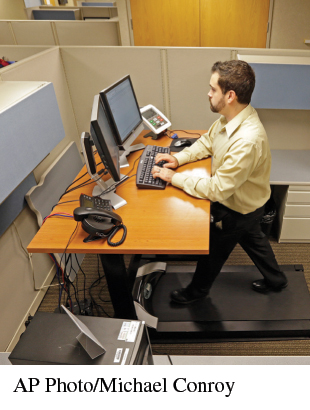Personal and Financial Health at Work
Behaviors that nurture your personal and financial health at school will help you do the same at work. And employers want healthy, financially stable employees, who tend to be the happiest and most productive.17 When you’re healthy and financially secure, you’ll also enjoy your job more. Consider these ideas for securing your health at work — and reaping the rewards.
Boost Your Productivity
Eating healthy and managing stress (including financial pressures) can boost your productivity at work. After all, when you feel well and in control, you can get more done. Here are some simple but powerful ideas.
FOR DISCUSSION: Ask students: Why is it that healthy, financially stable employees tend to be the happiest and most productive? What role does stress play? How does mental health contribute to enjoying your job more?

Brown-bag it. Packing your lunch gives you complete control over your diet — and it’s a lot cheaper than buying food at work.
Get moving. If you have a sedentary job, make an effort to move around. Take the stairs rather than the elevator, or park your car far from the front door. Go for short, brisk walks during work breaks. If your job involves a lot of repetitive motion, such as operating a piece of equipment over and over in the same way, occasionally flex your muscles and stretch to avoid getting tendinitis or repetitive-movement injuries.
Take breaks. It’s hard to stay productive at work without taking short breaks. Spend a few minutes throughout the day relaxing and taking deep breaths. Step outside for some fresh air. Or chat with a coworker for a few minutes while you’re refilling your mug at the water cooler.
Manage your mental health. If you’re in a job that generates a great deal of emotional stress (such as social work or law enforcement), that stress can erode your productivity if you don’t take steps to manage it. Take extra care to manage your mental health — for example, talk with a therapist, practice relaxation techniques, or spend quality time with people who love and support you.
Use your company’s wellness plan. Many companies offer a wellness plan as part of their employee-benefits package. Wellness plans can include a variety of services, such as help with quitting smoking or a discounted gym membership. If you take advantage of these options, you might even get a break on your health insurance premiums.
Manage Work Budgets
ACTIVITY: Give students a profile for a fictitious company, and ask them to create a budget using the guidelines of your choice. In class, have students discuss their experience. What challenges did they encounter?
The budgeting skills you use to manage your own financial health can also keep your company “healthy.” For instance, suppose you own a small business. If you find creative ways to cut travel costs, you might free up funds you can channel into your marketing budget — and boost sales as a result.
Or let’s say you’re a manager responsible for tracking your group’s revenue and expenses. If your organization wants to boost profitability, you might scour your departmental budget, looking for places where your team can cut spending or increase revenue. And if you’re not a manager? You can still help brainstorm ideas for enhancing revenue and reducing costs — something every organization appreciates.
voices of experience: employee
MANAGING STRESS

| NAME: | Nadine Hernandez |
| PROFESSION: | Program Specialist |
| SCHOOL: | Rio Hondo College |
| DEGREE: | Associate of Arts |
| MAJOR: | General Studies |
“Using stress-management techniques has been a crucial part of my success.”
It’s taken me many years, but I’ve figured out how to manage stress, and I am much more successful today because I’ve learned that I have to take care of myself first. I was the first in my family to go to college, and during the many years I spent working on my A.A. degree, I had the thought in my head that “people like me don’t go to college.” As a first-generation college student and single mother, I had no educational support from an adult, like a role model or mentor. I also had child-care issues, and I worried about my daughter’s and my younger sister’s and brothers’ well-being — and this was in addition to dealing with family finances and balancing part-time work, school, and parenting. All of these things were incredibly stressful and made it challenging to stay in school. One day I decided to go to the counseling center on campus, where I learned ways to manage the anxieties and fears I was experiencing.
I now work as an EOPS (Extended Opportunities Programs and Services) Program Specialist, where I get to work with educationally and economically disadvantaged students by supporting them with guidance from start to finish through the community college process. I also plan and conduct workshops for economically and educationally disadvantaged single mothers who live below the poverty line and are going to college. I teach my students the same stress-management skills that I continue to use today: Take care of yourself first, prioritize your tasks, eat healthy, and get rest and regular exercise. I also encourage students to use the counseling center if they need more help. Using stress-management techniques has been a crucial part of my success, and I enjoy helping others use these tools to succeed.
YOUR TURN: If you’re currently working and have experienced stress on the job, have you used any of the stress-management techniques Nadine found useful? If so, which ones? What, if any, additional strategies have you found helpful? If you’re not currently working but have a career in mind, what might be the most difficult stressors associated with that career? How will you manage them?